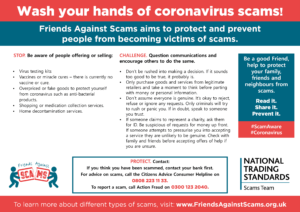We all have to be so careful not to fall for a scam, or spread misinformation.
Here’s how to prevent it.
1. Read the government’s SHARE checklist. For website click here.
When shared, false information can take on a life of its own and have some serious consequences. It can lead to health scares, false accusations and potentially damaging hoax stories. Recently there has been a lot of this kind of false information about coronavirus.
It’s not always easy to spot, so use the SHARE checklist to make sure that you don’t feed the beast:
S = SOURCE Rely on official sources for medical and safety information. Check the facts about coronavirus on the NHS website and GOV.UK.
H = HEADLINE Headlines don’t always tell the full story. Always read to the end before you share articles about coronavirus.
A = ANALYSE Analyse the facts. If something sounds unbelievable, it very well might be. Independent fact-checking services are correcting false information about coronavirus every day.
R = RETOUCHED Watch out for misleading pictures and videos in stories about coronavirus. They might be edited, or show an unrelated place or event. Check to see who else is using the photo.
E = ERROR Look out for mistakes. Typos and other errors might mean the information is false. Official guidance about coronavirus will always have been carefully checked.
2. Get familiar with the most common COVID-19 related scams.
Trading Standards have identified the some common COVID-19 scams:
- Doorstep crime
Criminals targeting older people on their doorstep and offering to do their shopping. Thieves take the money and do not return.
Doorstep cleansing services that offer to clean drives and doorways to kill bacteria and help prevent the spread of the virus.
- Online scams
Email scams that trick people into opening malicious attachments, which put people at risk of identity theft with personal information, passwords, contacts and bank details at risk. Some of these emails have lured people to click on attachments by offering information about people in the local area who are affected by coronavirus.
Fake online resources – such as false Coronavirus Maps – that deliver malware such as AZORult Trojan, an information stealing program which can infiltrate a variety of sensitive data. A prominent example that has deployed malware is ‘corona-virus-map[dot]com’.
- Refund scams
Companies offering fake holiday refunds for individuals who have been forced to cancel their trips. People seeking refunds should also be wary of fake websites set up to claim holiday refunds.
- Counterfeit goods
Fake sanitisers, face masks and Covid19 swabbing kits sold online and door-to-door. These products can often be dangerous and unsafe. There are reports of some potentially harmful hand sanitiser containing glutaral (or glutaraldehyde), which was banned for human use in 2014.
- Telephone scams
As more people self-isolate at home there is an increasing risk that telephone scams will also rise, including criminals claiming to be your bank, mortgage lender or utility company.
- Donation scams
There have been reports of thieves extorting money from consumers by claiming they are collecting donations for a COVID-19 ‘vaccine’.
- Loan sharks
Illegal money lenders are expected to prey on people’s financial hardship, lending money before charging extortionate interest rates and fees through threats and violence
3. Join Friends Against Scams – and tell your friends. Read the image below and click it to reach the website.

